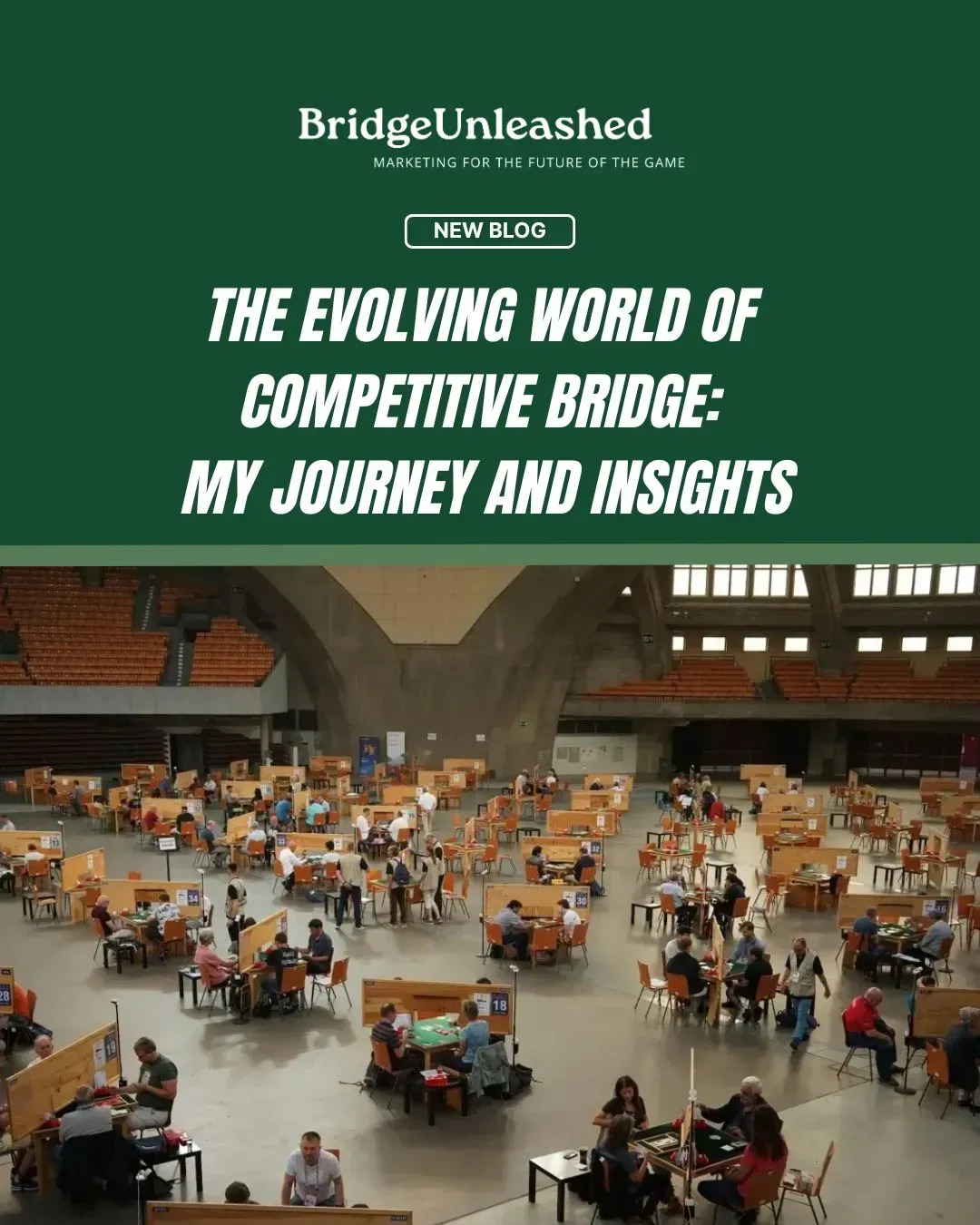
The Evolving World of Competitive Bridge: Chip Martel and Marty Fleisher
Bridge isn’t just a card game; it’s a lifelong journey filled with continuous learning, camaraderie, competition, and personal milestones that make it unique among mind sports. Having spent decades immersed in the world of competitive bridge, I’ve witnessed firsthand how the game has evolved—sometimes dramatically—with the rise of technology, new tournament formats, and shifts in what it means to be part of the bridge community. In this post, I’ll share my experiences and thoughts on these changes, and why, despite everything, bridge remains an endless source of fascination and joy.
The Pinnacle of Competitive Bridge: Tournaments and Technology
For many of us, the North American Bridge Championships (NABC) and the US trials represent the gold standard in competitive bridge. These tournaments attract top players from all over the world, earning praise as some of the best in existence. Interestingly, opinions are sharply divided about one of the major recent innovations: playing final events on tablets instead of traditional cards.
Tablets vs. Table Play: The Ongoing Debate
I’m firmly in the camp that sees immense value in the use of tablets—especially when it comes to eliminating unauthorized information (UI) and generating a complete, accurate record of play. No longer do we have to wonder if a card was played or misrecorded; everything is logged perfectly. The ability to observe all tables in action, not just a select few, is a game-changer.
Beyond logistics, there’s actually a surprisingly social benefit: with digital setups, it’s just you and your opponents in a room, able to hold candid discussions without worrying about disturbing others. I adore the open, analytic conversations these settings allow—debating system details, questioning bid decisions, and just enjoying the company.
Of course, not everyone agrees. Some players, particularly those with keen “table feel,” prefer in-person play, believing their ability to intuit opponents’ intentions offers a real edge. I understand where they're coming from; there’s a certain magic in reading the room, sensing shifts, and making gut calls that computers can’t capture.

LoveBridge and Game Analytics
Tools like the LoveBridge system have further changed how we interact with our game data. While some love diving into stats and analyzing every hand, I confess I mostly look for metrics where I’ve performed well (who doesn’t like a confidence boost?). My partner, Chip, isn’t heavily into the data, either—we focus on the enjoyment and improvement aspects rather than getting bogged down by numbers.
Hall of Fame: Recognition, Doubt, and Pride
For any bridge player, being inducted into the Bridge Hall of Fame is an honor—but it’s also an emotional rollercoaster. When I started playing seriously just 15 years ago, I gave myself zero chance of ever making it onto the ballot, let alone being elected. I was delighted simply to be nominated, to have my name listed among greats. Receiving that call confirming my induction filled me with pride and gratitude. However, in a twist worthy of the game itself, a ballot flaw temporarily voided my election—an anxious moment, but everything ultimately worked out.
The Hall of Fame process is itself a microcosm of bridge: complex, uncertain, requiring both individual achievement and recognition from your peers. Every year is different, and just getting onto the ballot feels like a win in itself.
Early Achievements and Bridging the Gap for Newcomers
Many competitive players, myself included, discovered bridge young—often before the age of ten. Reaching the finals of national championships as teenagers and winning major world titles in my twenties shaped my view of what's possible with dedication and passion.
But explaining bridge to a total newcomer is tough. I often liken it to trick-taking games like Hearts, since most people have at least a passing knowledge of them. But bridge’s complexity, with its partnership bidding and endless strategic variety, makes it hard to capture in just a few words.

Lifelong Engagement: The Social, Strategic, and Enduring Appeal
So why do we keep coming back to bridge after decades of play? The answer lies in its layered complexity and the joy of endless discovery. Even after 50 years, I regularly come across fresh situations and new tactics. Friends joke, “Haven’t you seen everything by now?” But as any veteran will confirm, even those who’ve played tens of thousands of hands haven’t seen it all.
There’s also the sheer social dimension. Unlike solitary pursuits like chess, bridge brings people together—across tables, clubs, countries, and now even continents. The relationships formed and strengthened through bridge are as valuable as the trophies won.
Finally, bridge is unique: despite rapid progress in artificial intelligence, computers still struggle to match humans at the highest level. It’s a testament to the subtlety and depth of our game.
Partnership and Teamwork: The Heart of Success
One of the most critical lessons bridge teaches is the value of partnership. Many new players overlook how much a positive attitude and supportive communication matter. If you undermine your partner—intentionally or not—you’re hurting your own score as much as theirs. I always strive to be empathetic, understanding that everyone makes mistakes and that bidding decisions aren’t always clear-cut. Sometimes the best thing you can do for your team is give everyone a little space before hashing out errors after a tough match.
Conclusion: Why Bridge Will Always Matter
Bridge’s enduring magic lies in its ability to evolve and stay fresh while never losing what makes it special: challenge, community, and endless intellectual stimulation. Whether you thrive on the thrill of competition, the delight of collaboration, or the pursuit of mastery, bridge has something for you—and probably always will.
If you’re a longtime player, I hope these reflections resonate. If you’re new or simply curious, let this serve as your invitation: bridge is waiting, and its best stories are yet to be written.
Learn More: https://bridgeunleashed.com/game
